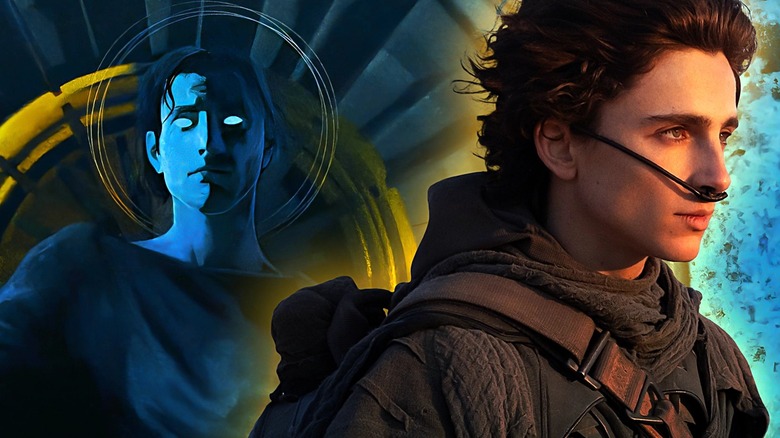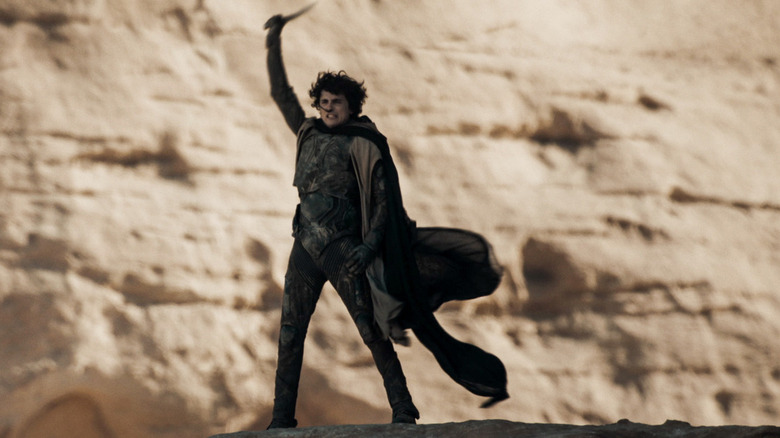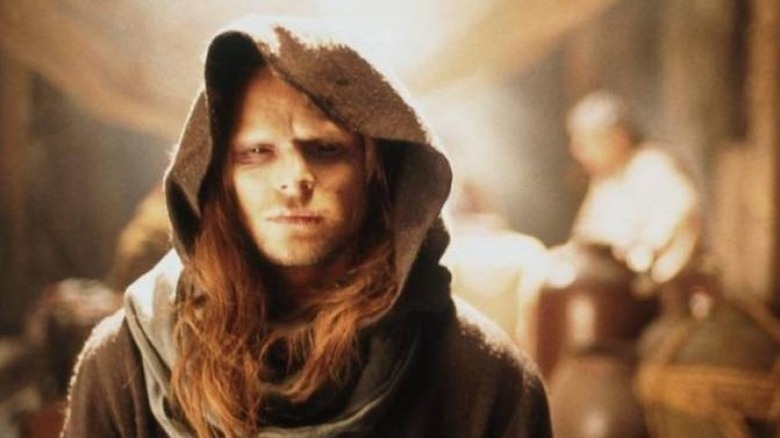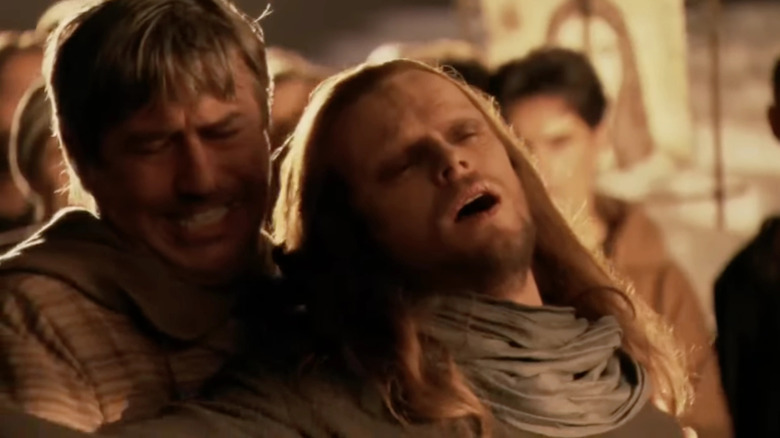What Happens To Paul Atreides In The Dune Books?
Frank Herbert's "Dune" is one of the biggest and most influential sci-fi books of all time. It has inspired everything from Hayao Miyazaki's "Nausicaä of the Valley of the Wind" to "Star Wars," and so much more.
Though the "Dune" book series is full of fascinating, bizarre, influential ideas, the first book in particular remains a masterclass in telling a simple story that nevertheless contains a wealth of lore and world-building. It's a lived-in and fleshed-out universe where you get a sense of history, politics, characters, and plots moving independently of the main story. The story of Paul Atreides may also appear simple at first: a coming of age tale about a teenage boy finding his destiny and becoming a leader. For movie fans who have only seen the messy yet ambitious David Lynch version, you might think Paul is a clean-cut Campbellian hero who avenged his father and freed an oppressed people by fighting the evil empire.
But that would ignore what differentiates "Dune" from, say, "Star Wars." Herbert had something else in mind, and when book readers misunderstood the point of Paul's journey, the author used the sequels to double down on making this a cautionary tale about messianic figures and populist leaders. Denis Villeneuve already made a lot of progress in making "Dune Part Two" very clearly a bleak indictment of messianic leaders, but it's only after Paul becomes emperor that the real story of "Dune" begins.
Huge spoilers for "Dune Messiah" and "Children of Dune" to follow.
The rise of Emperor Paul Muad'Dib
"Dune Messiah" is Frank Herbert's big counterargument to himself and the first book: a correction for fans who misunderstood his message and turned Paul into an ideal hero. Indeed, the rather short book (at least compared to the first "Dune") is more of an extended epilogue than a proper sequel.
The story takes place 12 years into Paul's reign, after his jihad has already brought death to trillions, extinguishing noble houses and sterilizing entire planets. Once he suppressed all rebellions and took control of the entire Known Universe, Paul began fulfilling his promise to the Fremen in terraforming Arrakis, transforming the barren desert into a lush, fertile green place. Of course, plenty of people are angry about this, and Paul faces a myriad of plots against him that end up colliding and bringing him to ruin. There's the Bene Gesserit (who want genetic control of House Atreides), the Spacing Guild (resentful that they no longer control the spice trade), the Tleilaxu (who want Paul to depend on them), as well as fringe groups within the Fremen tired of Paul acting like an emperor and not a warrior, and even Paul's wife, Princess Irulan (who hates Paul for taking her father's throne).
Paul rules mostly by relying on his prescient abilities, which also show him the inevitability of these plots against him. During an attack by the Tleilaxu, a bomb detonates in Arrakeen which blinds Paul, though he continues to be able to see thanks to his visions of the future. Still, the attack starts messing with Paul's mind, and he starts doubting his interpretation of the future, eventually seeking a way to escape the future he saw. Not long after, Chani dies in childbirth after giving birth to twins, both with Paul's powers. After Paul kills an assassin holding a knife to his children, Paul declares he can no longer see the future, since he failed to predict that Chani would give birth to a boy in addition to a girl.
Following Fremen tradition, the blinded Paul leaves his sister Alia in charge of the Imperium and sets out into the deep desert to offer his life to Shai-Hulud, finally avoiding the future he had seen and was terrified of.
The Preacher goes into the desert
If "Dune Messiah" was a counterargument to the military and political rise of Paul Atreides, then "Children of Dune" is the counterargument to the religious rise of Muad'Dib, to the very idea of the Lisan al Gaib and to Paul using religion to gain a following. The book is all about the uniqueness of the Fremen as a culture and religion, and how closely it's tied to the ecology of Arrakis.
When Paul walked into the desert at the end of "Dune Messiah," he was not only abandoning his family and his empire — he was specifically running away from his prescience. As we see in the Denis Villeneuve movies, Paul knows that his future brings unspeakable atrocities and death. What the first two "Dune" movies don't show, however, is that Paul specifically sees a vision not just of him overthrowing the emperor and avenging his father, but a vision for humanity's future that his son, Leto II, would call the Golden Path. This vision requires Paul to commit even more unspeakable atrocities and oppression, as well as shed his own humanity to achieve it. He can't bring himself to become a sandworm-hybrid or to be alone for thousands of years, so he abandons his mission and chooses to commit suicide by sandworm.
But before he dies in the desert, Paul is captured by a rogue Fremen tribe of Jacurutu and held captive, forced to ingest spice. This causes Paul to discover what would become of the Fremen in his absence under his sister Alia's leadership, how the Fremen lost their way, their culture slowly fading away due to the terraforming of Arrakis — which has even allowed for some Fremen to live on the surface without stillsuits.
Hellbent on denouncing both Alia and also his own failings as Muad'Dib, Paul emerges from the desert years later, calling himself the Preacher.
The death of Paul Muad'Dib Atreides
The Preacher spends most of "Children of Dune" railing against the Fremen for losing their way, against Alia and her government, and against the legacy of Muad'Dib for taking the Fremen out of their traditions and forcing them to be a part of the Known Universe's politics.
Eventually, Leto II finds the Preacher and learns he is actually his father Paul. The two talk and discuss the Golden Path, with Paul lamenting that his son is shedding away his humanity in order to accomplish what he could not. Leto II asks Paul to do one last thing for him: give one last sermon. And so the Preacher returns to Arrakeen to confront Alia (who, by the way, is possessed by the spirit of Baron Harkonnen) one last time. In the turmoil, the Preacher is publicly assassinated by the very people who once worshipped him as Paul Muad'Dib. Alia then fatally leaps from an open window in order to escape the Baron's influence. After her death, Leto II takes the throne and soon enough becomes the God Emperor of Dune.
That is the end of Paul Muad'Dib Atreides, a man who took advantage of ancient superstitions and religious propaganda to rise to power and was worshipped by millions as a messiah, who killed trillions in order to set humanity on a path to avoid stagnation and ruin. If Paul walking into the desert weakened his image as a deity in the eyes of the Fremen, then the Peacher truly awoke the sleeper and showed the Fremen how ignorant they were to what was happening.



